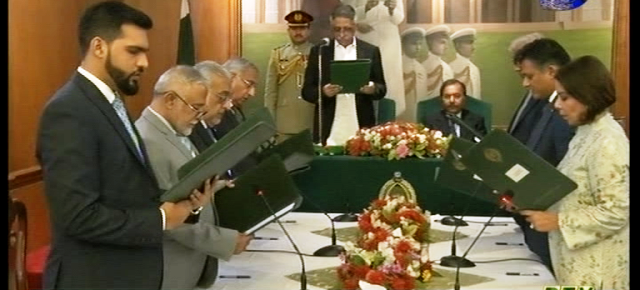Caretakers on tenterhooks
It should be noted that the Constitution does not make any distinction between permanent and caretaker governments

Sindh caretaker cabinet takes oath. PHOTO: EXPRESS
With the completion of tenure of the outgoing governments, two distinct challenges had reared their heads. The first and obvious one was regarding the holding of free, fair and transparent elections on the due date. The second critical challenge, no less important, was regarding the best way to deal with the free fall the economy has been experiencing. The outgoing government did not pass on any blueprint for its successors to follow, who have been constrained by the Electoral Reforms Act and are pretty much confined to routine decision-making.
The country, as of today, is faced with a mounting current account deficit, staggering imports coupled with sluggish exports, and depleted reserves. Holding of the general elections and attendant arrangements do not concern the federal government as much they obligate the provincial governments, where much of the action is taking place. Adherence to well-defined operating procedures without any let-up can ensure vindication in this regard. For the federal outfit economy remains the paramount concern, and it was expected that the stakeholders would agree on a caretaker prime minister with sound economic grounding and financial management skills. There were quite a few names in circulation in this regard. The PPP, however, as expected deferred to the preference of the PML-N and agreed to the name of the present caretaker prime minister who had a distinguished career in his own field. Concerns of the economy, for this brief critical spell, have been relegated. The caretaker finance minister had a formal interface with the media on the grim economic situation. While she was concerned with the current state, as underlined by her, not much can be done by the caretakers for want of a mandate. The caretakers seem to be banking on the amnesty scheme for a temporary bailout, and there are serious reservations on that count.
It should be noted that the Constitution does not make any distinction between permanent and caretaker governments. Legislation cannot fetter a government from taking steps that may be warranted in any given situation. The caretakers need to come out of their laid-back grooves and proactively interact with the economic teams of political parties in order to come up with a doable action plan. There is no harm in holding some clauses of the much-touted Electoral Reforms Act in abeyance for the time being, possibly through the passage of an ordinance. What if a situation of force majeure rears its head? Would the caretakers still hide behind the cloak of electoral laws?
The situation in Punjab presented interesting twists and turns before the approval of the present chief minister by the Election Commission of Pakistan. Dr Hasan Askari Rizvi, a university professor, well-known columnist and a familiar face on talk shows, was the PTI’s nominee. The PML-N brandished its guns against him, imploring the professor to recuse himself from the responsibility. The outgoing prime minister, with a battery of ex-ministers, appeared before the media raising a hue and cry over this appointment. Dr Rizvi did not oblige them. His disposition in talk shows during the PTI dharna had never made the PML-N too comfortable. The ECP dismissed the PML-N’s pleas and clarified that the party never filed its objections, which could have been deliberated on and considered. This line of argument shows innate inadequacy as the ECP can carry out its independent lowdown on prospective candidates. The political parties in this case had failed to reach consensus despite a week’s deliberation while the ECP was able to finalise its findings in just 60 minutes. The ECP claimed that the decision was made keeping in view the qualifications of the incumbent. Such a disposition grossly overlooks the fact that the incumbent has neither had the exposure nor the requisite training needed for public office and the complexities of administration. The aftermath of this decision is now becoming obvious. Only a few days ago, an owner of a private school was inducted as the provincial education minister, entrusted with the duty to oversee public-sector education as well as the largest workforce of the country’s most populous province. Feeling the heat of criticism, the portfolio was withdrawn in 72 hours and the gentleman has now been made minister of a couple of other departments. An informed electorate wishes to know the basis of such a selection, reasons for its retraction as well as for the gentleman’s retention in the cabinet.
Merit and educational credentials were cast aside by the ECP while approving the name of the caretaker chief minister of Balochistan. The present incumbent was preferred to a highly accomplished diplomat who had served the country in key capitals and remained special representative to the UN secretary general in Iraq and Darfur. In Khyber-Pakhtunkhwa, an incumbent, who retired from the Supreme Court as a judge amid controversy over a full court reference, was preferred to a two-time chief secretary with proven skills and reputation as a thorough team man.
While the ECP’s mandate is unassailable, the electorate wishes to know the basis for its formulations on such critical decisions. It’s time now that such proceedings and their various stages took place in full knowledge of the public at large.
Published in The Express Tribune, June 23rd, 2018.
Like Opinion & Editorial on Facebook, follow @ETOpEd on Twitter to receive all updates on all our daily pieces.















COMMENTS
Comments are moderated and generally will be posted if they are on-topic and not abusive.
For more information, please see our Comments FAQ